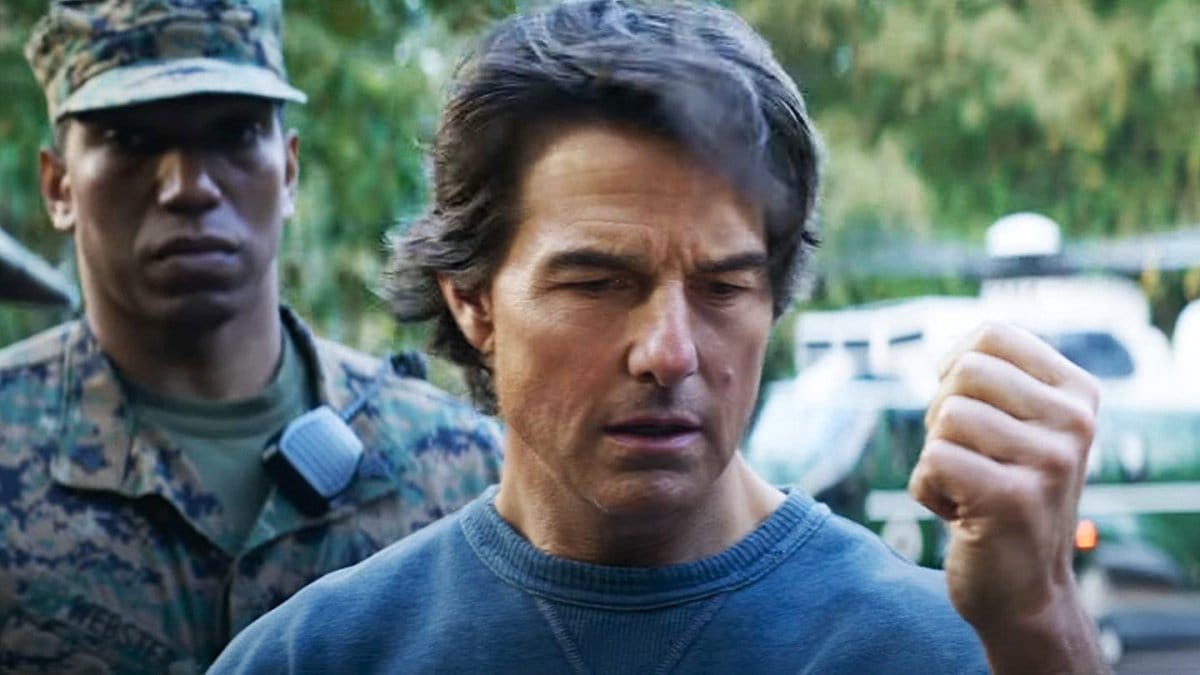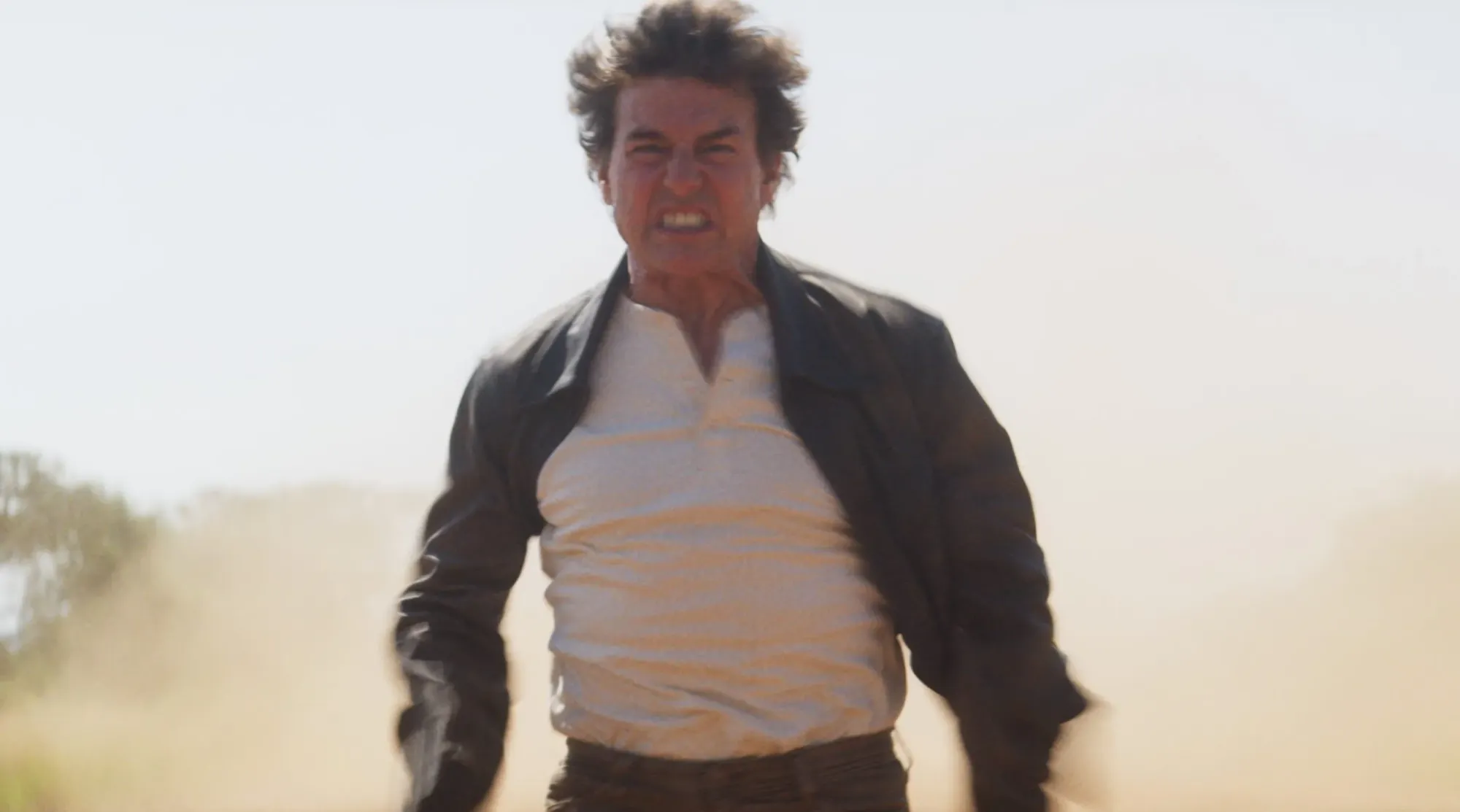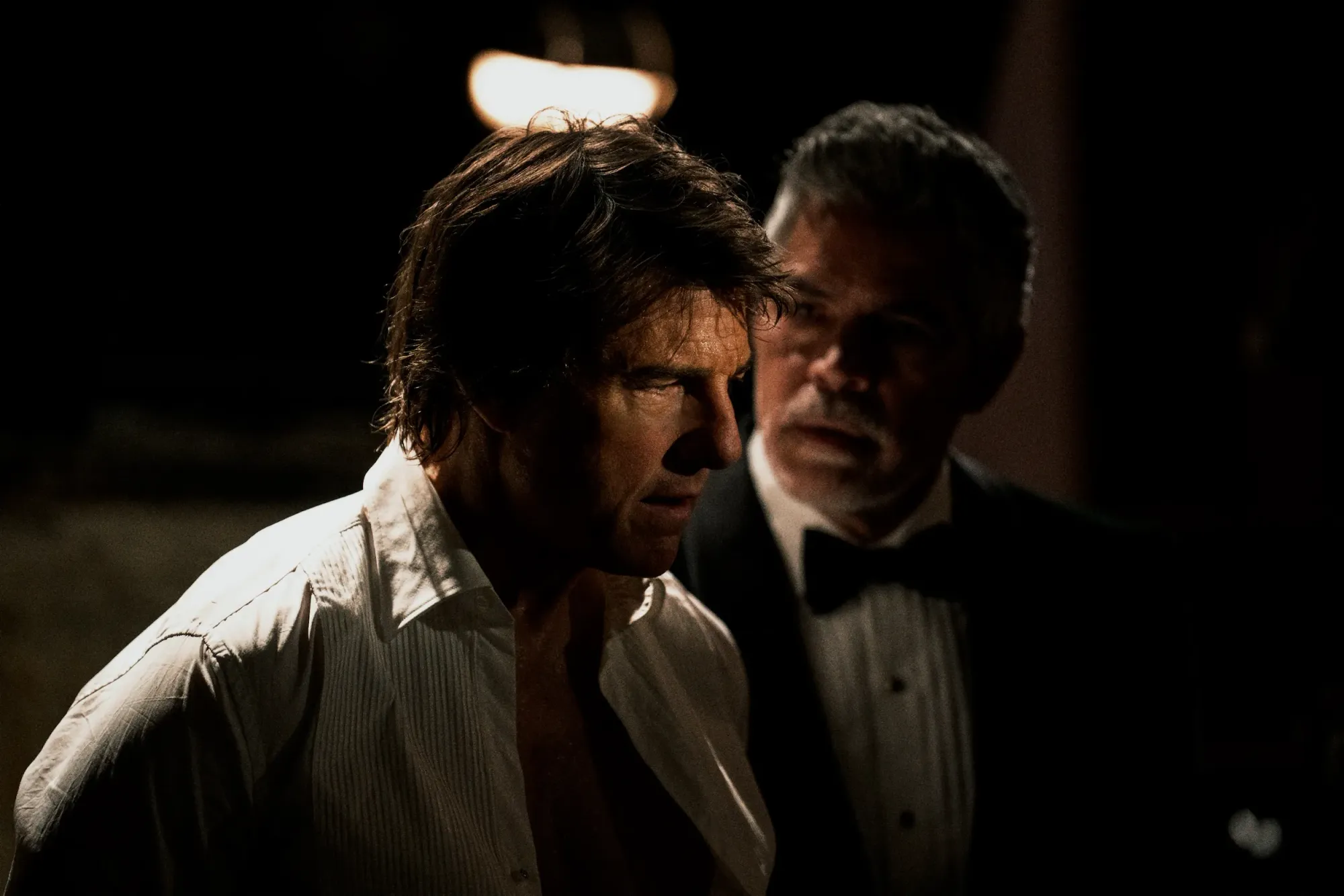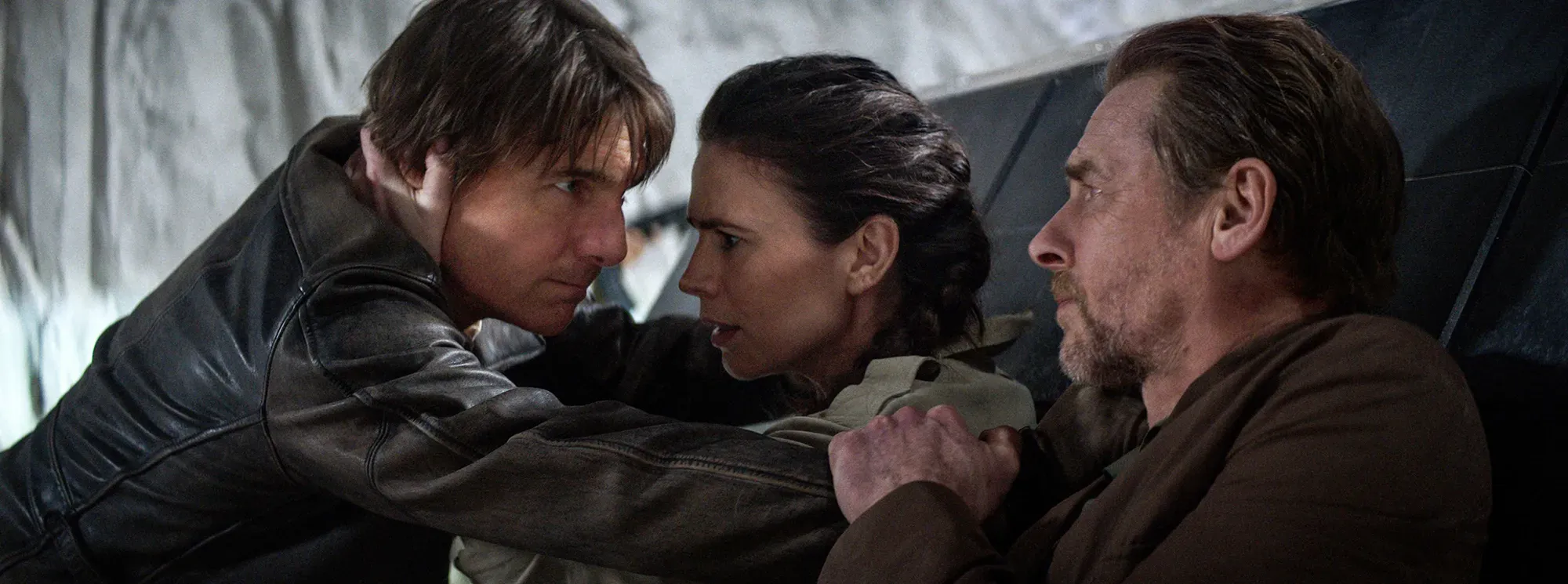Tom Cruise probably doesn’t believe in God. Not in the usual Christian sense, anyway - in all likelihood, he worships some kind of Eldritch Scientological being that feeds on celebrity secrets and extortion. But does that preclude a man from becoming a god by other means? Is becoming a god a choice or is it a responsibility thrust upon those most worthy? These are absolutely not questions that Mission: Impossible - The Final Reckoning (referred to going forward as TFR to save you from having to roll your eyes too many times) is trying to make me ask, and yet I found myself pondering them nonetheless.
With TFR, Tom Cruise has ascended to another plane of movie star existence. He’s the action star. He’s the leading man. He’s the character actor. He’s the stunt man. He’s the man everyone wanted to have sex with in both Eyes Wide Shut and in real life (unless your name is Katie Holmes and it’s 2005, or you just found out about him having a tooth in the middle of his face). This is the Holy Quadrinity of superstardom, and Tom Cruise just took a seat upon his Olympian throne before our very eyes. He may have already possessed these qualities prior to TFR, but this presumably final outing for the franchise is a pious punctuation that proves Cruise has mastered it all. Does the movie do Cruise’s divine presence justice? For the most part.

TFR picks up where Mission: Impossible - Dead Reckoning Part One (apologies, that’s the last requisite eye roll) left off, with the villainous and nebulous AI known as the Entity having already wreaked havoc on the world through misinformation and fear mongering. Gabriel (Esai Morales), previously an acolyte of the Entity, is now disgraced and has grander ambitions of controlling the virus. Ethan Hunt (Tom Cruise) is in possession of multiple MacGuffins: a key that supposedly unlocks a safe that contains the Entity’s source code, as well as a “poison pill” created by Luther (Ving Rhames) that he intends on using to capture the Entity. Gabriel needs both these devices for his nefarious plans, and thus the events of the film are underway. What’s that? We’re already an hour in? What’s been filling Ethan’s precious time?
Mostly flashbacks and references to previous M:I movies, with varying degrees of success. As a devout fan of the past five M:I films, I’m embarrassed to admit that I have never seen the first three. You’d think this would put me at a disadvantage when it comes to these plentiful references, but the movie goes above and beyond to make sure that anyone without much knowledge of the series’ history won’t be on their back foot. This results in a movie bloated with a Matryoshka doll of explanations within explanations within explanations of things that, frankly, don’t need to be explained at all. Did we need a scene where the Entity tortures Ethan while explaining its entire plan? Or one where we’re told the “truth” of what the MacGuffin in M:I III was all along (yeah, right)? Or yet another scene of Hunt explaining his nigh-impossible plan to his (largely sidelined, save for Hayley Atwell) team in comical detail, imploring them to trust him one last time?

The problem isn’t the quality of the exposition - it’s hilarious techno-gobbledygook in the most entertaining way possible - it’s the quantity. Previous iterations have done a magnificent job of getting their convoluted conspiracies out on the table early, then backing off to let us bask in the glory of flashy action extravagance. This latest outing also opts to frontload the talkiness…but something went wrong; the talking never ends, and you start to lose your trust in the film to punctuate the chatter with some well-earned fisticuffs. Once it finally gets there, though, TFR is unstoppable.
Hunt’s delve into the Sevastopol, the self-immolated nuclear submarine that houses yet another MacGuffin, is tension perfected. The wordless underwater sequence (save for Hunt’s singular utterance to himself/the audience: “torpedo tube”) takes Hunt through the long-abandoned sub; dodging dislodged missiles, grappling with endless doors, and fighting against his perennial nemesis: time. It’s a long build-up of sheer anxiety as Hunt sheds more and more of the equipment keeping him safe so far below the surface. Finally he emerges, nearly naked, unconscious but floating towards safety - and towards a strangely gratuitous shot of Hayley Atwell’s cleavage. Among all the death-defying acts Hunt has committed in his time as an IMF operative, this feels the most purely exhilarating. The stakes have been exhaustively set up, and your reward is about 20 minutes of nail-biting payoff.
This set piece sends the movie careening through scene after scene of silly-serious dialogue free from the shackles of the first hour’s exposition overload. The tone remains firmly in that fragile milieu between being so stupid that it becomes unbelievable and too clever for its own good; it’s winking at you but not enough for you to doubt its earnestness. Director Christopher MacQuarrie has mastered this precision over the course of his four M:I entries and though TFR does come the closest to flying too close to the dumb sun, he always manages to shift gears before your suspension of disbelief snaps.

One scene, however, takes on a bizarre mood that’s new to the franchise: palpable bleakness. I like to call it the “sweaty generals scene”. The US president (Angela Bassett) and her advisors are hunkered in their bunker, knowing that they’re the last of the major world powers that hasn’t had its nuclear arsenal hijacked by the Entity. They consider the unthinkable: preemptively strike all other nuclear-equipped nations while, as a token of good faith, striking down an American city as well. It’s a ludicrous suggestion, but one that’s taken rather seriously by everyone in the apparently sweltering room. Through a series of uncomfortable close-ups that highlight each bead of sweat on the advisors’ faces, they offer their thoughts with a matter-of-factness that could only be brought on by an imminent apocalypse.
In a vacuum, this short scene is phenomenally stirring. Within the context of a M:I movie, though? I struggle to see where it matches the vibe. Christopher Nolan somehow brought more levity to Oppenheimer’s scene in which President Truman decides where the United States will be dropping their nuclear bombs over Japan. It feels like McQuarrie was well aware of the fact that this is likely the last entry in the decades-old series, and he wanted to get all of his ideas out while he still could. I can’t bring myself to fault him for that - most of his ideas are damn good, so I’m willing to view his more experimental decisions with an open mind, not apprehension.
Spoilers
The film’s final set piece is the victory lap to end them all. Hunt and Gabriel are locked in a melee dogfight that turns into a slapstick display of stunt showmanship. Tom Cruise is having the time of his life maneuvering around a barrel-rolling biplane, and the only thought running through your head is sure to be a refrain of “how the hell did he do this?” Gabriel’s brutally undignified demise is fitting for a movie meant to shine the spotlight on one man and one man only. Then finally, finally, after all these years, we get to witness Tom do what we’ve all been waiting for - plug a USB into a hard drive to save the world. As inane as the moment is when described, it’s somehow electric in the hands of Cruise and McQuarrie. Only a god and his chief disciple could turn mundanity into an oaky action Merlot.

TFR is the most M:I movie. It’s the most silly; it’s the most serious. It’s the most tense; it’s the most overwritten. Oddly, it’s the least romantic, but that’s never been a staple of the franchise anyway. It’s only the second most in terms of letters in its title, which is plainly embarrassing. It’s the most people I’ve seen behave properly in a massive IMAX theatre, which is a testament to its impressive command of attention. And it’s certainly the most Tom Cruise.
Are you there Tom? It’s me, Joey. I’ve been thinking a lot about what happens to prestige dumb action franchises now. With John Wick ostensibly dead, M:I coming to an end, and James Bond in limbo for the moment, where can I get my fix of set piece-based expensive action that doesn’t involve Jason Statham or The Rock? Who will become our new saviour? TFR may have its fair share of flaws but I already miss it - and what it represents - dearly. We need these franchises for two obvious reasons: they’re good, and they make money. This is how movie theatres get saved. So who is willing and able to become the new hero, to fill the shoes of a bona fide deity and his directorial archangel?
Oh - it’s just Cruise and McQuarrie again, making Top Gun 3.
Mission: Impossible - The Final Reckoning
Great
Though not as perfectly paced as previous entries, TFR is still a delight. Your ability to stomach the silliness may vary, but Tom Cruise sells it like no other could.
Pros
- Tom Cruise
- Some of the most impressive set pieces of the franchise
- Once it gets going, it flies by
Cons
- Unnecessary callbacks to previous entries
- Questionable tonal shifts
- Exposition exhaustion
This review is based on a copy provided by the reviewer.





















